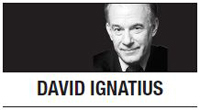[David Ignatius] Consequences of US disengagement
By David IgnatiusPublished : Aug. 20, 2018 - 16:41
 An Arab diplomat recently chided an American audience for speculating about what “the new Middle East” may look like. Open your eyes, he said: The new Middle East is already here.
An Arab diplomat recently chided an American audience for speculating about what “the new Middle East” may look like. Open your eyes, he said: The new Middle East is already here. And, personally, I fear its baseline expectation is that American power and values won’t matter in the way they once did.
The diplomat was Yousef al-Otaiba, the ambassador of the United Arab Emirates, and he was speaking at a public gathering last month of the Aspen Security Forum. He explained to an audience of policymakers and journalists the consequences of disengagement: “One very senior (US) official looked at me once and said there’s no constituency in the US for us doing more in the Middle East. When we hear that, it means we need to do things on our own.”
What does “doing things on our own” look like for Middle East nations? Well, it means closer relations with Russia and China, for starters. Otaiba noted that on the very day (July 19) he was giving his Aspen talk, President Xi Jinping had arrived in Abu Dhabi. And why not? China is the UAE’s largest trading partner.
Otaiba gave another example of the traditional regional order, transformed. He remarked that this year, “the prime minister of Israel (Benjamin Netanyahu) is (visiting) Moscow more frequently than he visits Washington.” Otaiba noted that if he had made such an observation 10 years ago, “you would have thought I was absolutely crazy.” (By my count, Netanyahu has this year made three Moscow trips but just one to Washington.)
A country that has dreamed, during the Obama and Trump presidencies, of being less entangled in the problems of the Middle East may finally be getting its wish. America is less involved, and inevitably, it is less influential.
Maybe I’m a foreign-policy dinosaur. But I still want a modernizing Middle East that shares America’s values, and I regret our loss of influence -- and even more, the way that decent people and ideas suffer when the umbrella of American hegemony is withdrawn or discarded. Since Otaiba’s remarks, I’ve seen new examples of bad decisions when leaders decide that Uncle Sam doesn’t matter.
Topping the list of this summer’s dumbest Middle East mistakes is Saudi Arabia’s move to punish Canada for criticizing human-rights policies in the kingdom. Crown Prince Mohammed bin Salman, known as MBS, looked hypocritical and harshly repressive for allowing Saudi women to drive and simultaneously cracking down on female activists.
MBS may not realize it, but the human-rights squeeze also makes him look weak under fire: It causes Western analysts to review their assessments about the possible spread of dissent against MBS within the Saudi royal family, business community, clergy and military. Sorry, your highness, but confident leaders don’t expel Canadian ambassadors.
I’m still rooting for MBS to succeed in reforming culture, religion and society in the biggest, most important Sunni Arab economy. But it’s harder for him to do the right thing in a post-American Middle East, where the role models are authoritarian leaders like Russian President Vladimir Putin and Chinese President Xi -- and the current avatar of American power is Donald Trump.
Even Trump seems to be having trouble managing MBS. The Saudis reportedly raised oil production in June to help pressure Iran; but in July, the Saudis reversed 40 percent of the increase, according to the Financial Times. Maybe MBS’ deal with Putin to manage oil prices through a so-called “OPEC Plus” matters more than any promise to Trump.
The summer’s second lesson in post-American folly is Turkey’s President Recep Tayyip Erdogan, a leader who seems convinced he can intimidate anyone. The trigger for this latest crisis is Erdogan’s refusal to release the detained US pastor Andrew Brunson apparently unless he’s exchanged for a convicted Turkish felon in an American prison.
Erdogan seems ready to abandon the NATO alliance itself, rather than compromise. He apparently thinks (like so many other leaders in the region) that if he riles America, he can make alternative deals with Russia or China. (You have to credit Trump for being as intractable in this feud as Erdogan.)
But guess what? Even in a world where America’s military and diplomatic power seems to be in retreat, there’s an element of the American-led order that’s as strong as ever -- our dominance of the global economy. Erdogan may think he can bluff his way through the Brunson crisis, but Turkish banks, construction companies and bondholders know better.
In the still-global economy, going it alone really isn’t an option, folks. This summer, as ever, we sink or swim together.
By David Ignatius
David Ignatius can be reached via Twitter: @IgnatiusPost. -- Ed.
(Washington Post Writers Group)











![[Today’s K-pop] BTS pop-up event to come to Seoul](http://res.heraldm.com/phpwas/restmb_idxmake.php?idx=644&simg=/content/image/2024/04/17/20240417050734_0.jpg&u=)




![[KH Explains] Hyundai's full hybrid edge to pay off amid slow transition to pure EVs](http://res.heraldm.com/phpwas/restmb_idxmake.php?idx=652&simg=/content/image/2024/04/18/20240418050645_0.jpg&u=20240419100350)

![[Today’s K-pop] Zico drops snippet of collaboration with Jennie](http://res.heraldm.com/phpwas/restmb_idxmake.php?idx=642&simg=/content/image/2024/04/18/20240418050702_0.jpg&u=)